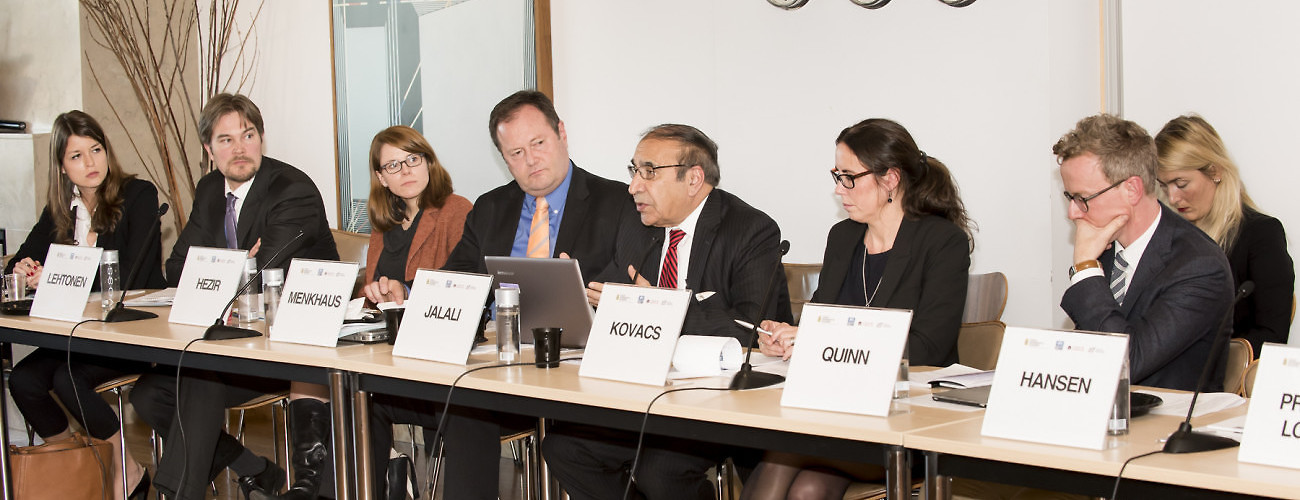A panel of academics, experts, and policy-makers considered the next generation of peace and security challenges at this year’s International Expert Forum (IEF) on governance, peacebuilding, and state-society relations, part of IEF’s series on 21st-century peacebuilding.
Gert Rosenthal, Chair of the UN Advisory Group of Experts on Review of Peacebuilding Architecture, said UN reform would be necessary to meet the challenges of the global era. “We are still stuck with an institutional framework designed for the past century, which is now supposed to address the challenges of the 21st,” he said. “This is the single most important conclusion of the report we prepared for the peacebuilding review.”
Ambassador Rosenthal made a number of key points. Firstly, integrating peace into a development agenda is itself a challenge. The vision of the UN charter was to insulate development concerns from unpredictable politics, and this was essential to the UN’s function during the Cold War era. “The separation of political consideration—particularly the maintenance of peace and security—from economic cooperation, from development, was functional to the work of the UN,” he explained. “It was this division that made it acceptable for countries with profound political differences to pursue cooperation in he economic and social spheres.”
The recently adopted Sustainable Development Agenda recognized, however, that such a divided framework could no longer work. The challenges a globalized world faces have equally important development and security elements necessary to developing any plan that might surmount them. The reasoning is that for the UN to successfully combat global terrorist networks or climate change, that planning will need to be coordinated together from the start.
Referring to the long-standing tension regarding spheres of influence for the General Assembly and the Security Council, which he described as a “turf battle,” Mr. Rosenthal outlined the key points of contention for the two principal organs.
According to Mr. Rosenthal, the General Assembly laments the Security Council’s creep into the development agenda through some recent mandate language for its Peacekeeping Operations, while the Security Council feels the Peacebuilding Commission operates as a back door into the maintenance of international peace and security—without election to the Security Council. “This is the tension that’s there, and it’s grown over the years to the point where it has made the organization a little irrational,” he said.
Another objective he offered the Security Council was to match its rhetorical commitment to prevention with action. “When you ask some of the permanent members, all five will tell you they are all for Ch. VI, preventative diplomacy, but in the crunch, they move very rapidly to peace operations,” he said.
On his area of expertise, peacebuilding, he said it was important to remember that peacebuilding is not exclusively a post-conflict activity, but occurs at all phases of the conflict cycle: before, during, and after. The problem with thinking of peacebuilding exclusively as a post-conflict phenomenon, as the Security Council agenda item on peacebuilding continues to describe it, is that such a “mindset relegates peacebuilding to a relatively peripheral activity because, of course, ending the conflict always take priority while peacebuilding can wait until the fire is extinguished,” he said. “What seems to be lost from sight is that proper peacebuilding interventions can avoid conflict in the first place.”
Another point Mr. Rosenthal made was that peacebuilding could not be successful without predictable long-term financing and a readiness to commit for the long haul. “Developing solid institutions of governance, and capacities to promote development, require timelines expressed not in years, but in decades,” he said.
 |
|
Séverine Autesserre, Associate Professor of Political Science, Barnard College, Columbia University, and author of the book Peaceland: Conflict Resolution and the Everyday Politics of International Intervention (Cambridge, 2014), presented the findings of her ethnographic research in conflict zones that demonstrated the importance of “everyday” elements of fieldwork in mission success. Such everyday elements can be “mundane elements, I mean the expats’ social habits, standard security procedures, habitual approaches to collecting information,” she said.
“Macro-level policies, strategies, institutions, discourses, are not the only determinate of peacebuilding effectiveness,” she added. “The everyday practice of peacebuilding on the ground matters tremendously. And it is by looking at these everyday practices and habits that we can understand why interveners contribute to understanding modes of operation that they know that we all know are inefficient, ineffective and even counter-productive.”
Despite widespread consensus that local ownership is essential to successful peacebuilding, “local stakeholders are rarely included in the design of international programs,” she concluded, challenging participants to find a better method of integrating these voices.
Elisabeth King, Associate Professor of International Education at New York University, and author of From Classrooms to Conflict in Rwanda (Cambridge, 2014), examined the results of education and youth programs on violence in the global South.
There are a record number of young people in the world today, sometimes making up more than half a country’s population. This phenomenon has been called “a youth bulge,” she noted. But exactly what age range does this describe? According to the UN, ages range from 15 to 24, the UN Educational, Scientific and Cultural Organization (UNESCO) defines it as 10 to 24, and the African Youth Charter from 15 to 30. Policy-makers need to have these diverse definitions in mind, as the needs of a ten-year-old are very different from those of a thirty-year-old, she said.
Depending on the audience, what this large demographic of young people represents can be quite different. “Youth are either a peril or a promise, a disaster or a dividend, troublemakers or peacemakers, depending on global, national, and local priorities,” she said. The policy-maker’s opinion about the youth bulge has implications on “programs and policies that are meant to address youth, and especially on education.”
Despite the dominant logic that education can be a bulwark against terrorism, many highly educated youths, even those who are employed, remain drawn to violence. Designing programs to address youths need to accommodate the diversity of their aspirations and hopes, not all of which are material. Self-identity and a desire to have an impact on one’s community are important factors that must be integrated into program design, she said, based on her interviews in Rwanda and Kenya.
Youth programs and job-skills training for young people have had mixed results, she said. Taking an overly simplistic view that education and jobs-skills training will universally prevent youths from participating in violent extremism will lead to a dangerous, and problematic waste of resources, she emphasized.
Dipali Mukhopadhyay, Assistant Professor of International and Public Affairs, Columbia University, and author of Warlords, Strongman Governors and State Building in Afghanistan (Cambridge, 2014) described “a new kind of governance” that emerged in Afghanistan under President Karzai in the early 2000’s. Drawing on the historical precedent of Ottoman “palace politics,” the new government designed a highly centralized state that appointed “governors” as proxies to extend its weak rule beyond Kabul to the 34 provinces. The governors appointed were more often than not warlords of the former regime, who had consolidated power in part because the US-led Coalition armed and funded these actors in its overthrow of the Taliban.
The book explores the mixed results of these warlords as governors. “Not all warlords were created equal, not all were capable or interested in governing on behalf of central government,” she said. “But there were a few that were just strong enough to infuse a weak government position with their strength, but they also had rivals, and they needed help, in other words, from the government in Kabul, in order to become and then stay dominant, so they were therefore more likely to do what was good not only for them but also for the regime in Kabul.”
Ultimately, her fieldwork in Afghanistan led Ms. Mukhopadhyay to the conclusion that under certain conditions, warlords can become effective governors on behalf of the state. This can even be necessary in the transition of weak states, she said.
“This kind of governance is a far cry from our common conception of ‘good governance,’ but it did in both of these provinces, represent a new kind of political order, in places where it did not exist before, and in a country which we have seen has been incredibly challenging to govern, not only in the past 15 years, but also historically,” she said.
The event was co-hosted by Folke Bernadotte Academy, the SecDev Foundation and the Center for International Peace Operations-ZIF.
Other speakers included Ali A. Jalali, Distinguished Professor, Near East South Asia Center for Strategic Studies (former Interior Minister of Afghanistan); Ken Menkhaus, Professor and Chair, Political Science Department, Davidson College; Shane Quinn, Head of Rule of Law Programme (Acting), Folke Bernadotte Academy; Henk-Jan Brinkman, Chief, Policy, Planning and Application Branch, Peacebuilding Support Office, United Nations; Marco Donati, Civil Affairs Team, Policy and Best Practices Service, DPKO/DFS, United Nations; Jago Salmon, Advisor UN/WB Partnership in Fragile and Conflict Affected States at United Nations; and Charles Chauvel, Team Leader, Inclusive Political Processes, Governance and Peacebuilding, BPPS/UNDP, United Nations. They gave their remarks under the Chatham House Rule.
Moderating the sessions were Maureen Quinn, Senior Director of Programs and Francesco Mancini, Non-resident Senior Adviser, from the International Peace Institute; with Mimmi Söderberg Kovacs, Head of Research, and Helena Vazquez, Head of Policy, Research, and Development (acting), from Folke Bernadotte Academy.








